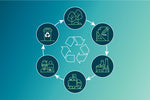
Talking About Rethinking Our Consumption Patterns
, by Planet Green, 2 min reading time

, by Planet Green, 2 min reading time
Plastic waste has become a pressing environmental concern, with only a small fraction of it being recycled worldwide. Despite efforts to recycle plastic, approximately 91 percent of plastic waste ends up in landfills, incinerators, or as litter in our environment. The scale of the problem is immense, with millions of metric tons of plastic finding their way into the oceans each year, posing a threat to wildlife and ecosystems. While initiatives like banning plastic straws have gained attention, they alone cannot address the colossal challenge of plastic waste. It is crucial the general public focus on reducing waste at its source, aiming for a significant shift in our consumption habits globally.

The first step towards reducing plastic waste is to rethink our consumption patterns. We live in a world where convenience often takes precedence over sustainability. By adopting a conscious approach to our purchases, we can significantly minimize the amount of plastic waste generated.
Consider the following strategies:
a. Embrace reusable alternatives: Opt for reusable alternatives such as cloth shopping bags, stainless steel water bottles, and glass containers. By replacing single-use plastic items with durable alternatives, we can drastically reduce our plastic waste footprint.
b. Say no to unnecessary packaging: Excessive packaging contributes to the plastic waste problem. Choose products with minimal packaging or seek out stores that offer package-free alternatives. Encourage manufacturers to adopt sustainable packaging practices.
Promoting A Circular Economy:
A circular economy focuses on minimizing waste by maximizing the lifespan and value of products. It aims to eliminate the concept of "throwaway" items. By embracing a circular economy model, we can reduce the demand for new plastic production and alleviate the burden on waste management systems.
Key strategies include:
a. Extended producer responsibility: Encourage manufacturers to take responsibility for the entire lifecycle of their products, including their disposal. Implement policies that incentivize eco-design and product recycling.
b. Recycling infrastructure and innovation: Invest in robust recycling infrastructure and promote technological advancements in recycling processes. This will facilitate the efficient conversion of plastic waste into reusable materials.
Educating and Engaging Communities:
To create a lasting impact, it is essential to educate and engage communities worldwide. Awareness campaigns and educational programs can foster a sense of responsibility towards reducing plastic waste.
Consider the following approaches:
a. Environmental education in schools: Incorporate environmental education into school curricula to instill sustainable values in the younger generation. Teach students about the environmental impact of plastic waste and empower them to take action.
b. Community initiatives: Encourage community-led initiatives such as beach cleanups, neighborhood recycling programs, and zero-waste challenges. By working together, communities can make a tangible difference and inspire others to follow suit.
These methods seem cumbersome to the individual and are often looked at as something a single person couldn’t achieve, but when sustainable practices are adopted on a global scale, it can make the difference between a growing epidemic of landfill waste and a clean green earth.

As stewards of the future, it's essential to educate children about the importance of recycling and conservation from an early age. By instilling environmental values...

The Earth stands as a magnificent cradle of life; a testament to the wonders of our universe. Hosting billions of humans alongside trillions of other...

As consumers, the choices we make have a significant impact on the environment. By supporting sustainable brands, we can contribute to positive environmental and social...

In today's world, environmental sustainability is a shared responsibility, and many organizations are stepping up to make a difference in their communities. Let's shine a...